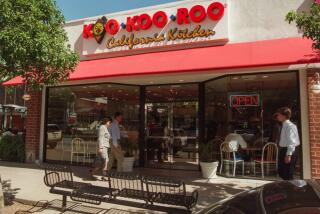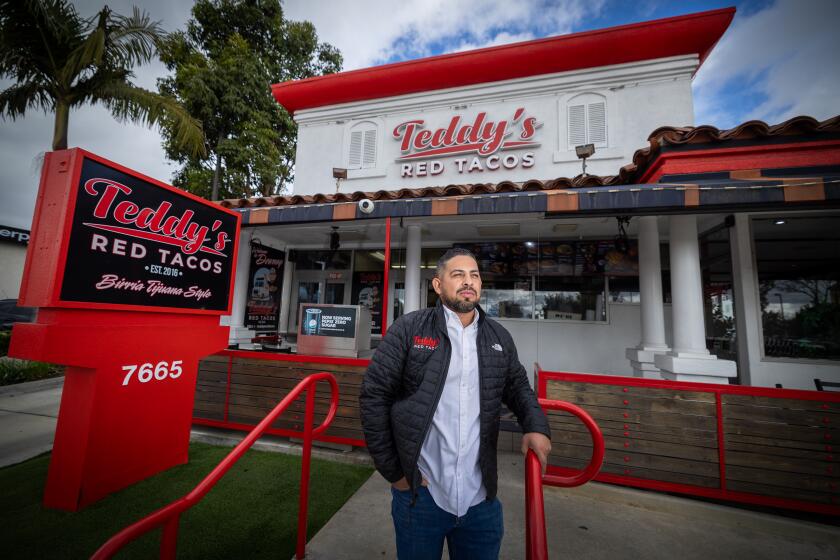Franchises Set to Pitch to Entrepreneurs at 2 Trade Shows
- Share via
Fast-food sushi, pottery parties, oxygen bars and grout.
Pursuit of the next hot franchise begins today in Los Angeles with the West Coast debut of the International Franchise Expo. Billed as the world’s largest franchise trade show, the three-day event is expected to draw 20,000 prospective entrepreneurs searching for the next Subway or 7-Eleven among the 200 exhibitors at the Los Angeles Convention Center.
Held annually in Washington since its launch six years ago, the show was moved to Los Angeles because of the city’s strong ties to the Pacific Rim and Latin America, according to Terry Hill, spokesman for the expo’s sponsor, the International Franchising Assn.
Hill expects as many as one-third of the show’s attendees to be foreign investors looking to replicate the latest American franchise concepts back home. He said the association hopes to turn the expo into a twice-yearly event, with the Los Angeles area playing host to the expo each fall.
“We are seeing strong growth in franchising internationally,” Hill said. “Los Angeles was a logical choice because it’s the most international community in the United States.”
Organizers of a competing West Coast franchise expo--the American Franchise Exhibition--say the real reason the IFE headed West is to preempt their first U.S. exhibition, scheduled for three days starting next Friday at the Long Beach Convention Center.
Producers of the IFE deny it. But what is clear is that over the next couple of weekends, no matter which show they attend, would-be business owners will encounter America’s irrepressible urge to franchise everything from miso soup to nuts.
Witness Eddie Okita, who wants to do for raw fish what Ray Kroc did for the hamburger. The president of Walnut-based Sushi Trend Co. has developed a fast-food sushi concept that he hopes will make “nori-maki” the ‘90s alternative to the Big Mac.
Using flash-frozen fish and replacing human sushi chefs with fully automated “robots” capable of cranking out 1,200 pieces an hour, Okita wants to introduce the Japanese staple to the masses by serving it fast and cheap. The first We (Heart) Sushi store is set to open this fall in Riverside, with half a dozen more in Las Vegas by the end of the year, Okita said.
“It’s quality sushi at McDonald’s prices,” said Okita, who will show off his concept at the IFE. “People are looking for something different.”
When it comes to starting their own companies, many budding entrepreneurs opt for franchises, the business equivalent of cloning. There are approximately 600,000 franchised businesses now operating in the United States, generating $1 trillion in yearly revenues--or almost half of all retail sales, according to the IFA.
Despite the well-publicized doldrums of mature chains such as McDonald’s and Taco Bell, franchising now spans 66 industries and continues to grow at a rate of 12% to 14% a year, thanks in part to corporate downsizing, says Mark Siebert, president of Francorp Inc., an Olympia Fields, Ill.-based franchise consulting firm.
Thousands of former executives and managers are looking for new careers and a place to park their severance packages. Increasingly, that “place” is a franchise, where following a standardized blueprint is one of the keys to success, Siebert said.
“The reason a lot of these people went to the Fortune 500 in the first place is because they aren’t risk-takers,” he said. “Now we’re seeing a lot of these corporate dropouts turn to franchising.”
Trouble is, purchasing a franchise doesn’t guarantee that the business will succeed, according to Siebert and other industry watchers.
Although promoters like to toss around an old government figure citing a 90%-plus success rate for franchises, subsequent studies have shown much steeper failure rates--as high as 75% for some brand-new concepts, according to Keith Kanouse, a Boca Raton, Fla.-based franchise attorney and author of several books on franchising.
Kanouse recommends that prospective buyers scrutinize the offering circulars of the franchise systems, which contain a mother lode of information, such as financial performance and pending litigation. He urges buyers to contact franchisees listed in those government-mandated disclosures and to be particularly cautious about investing in systems without a track record, despite the urgings of promoters who may try to convince them that getting in early means a potential for higher profits down the road.
In addition, he said, prospective purchasers should hire a lawyer to help them review leases and franchise agreements, which often are written to favor franchisers. Kanouse says buyers also must prepare a realistic business plan before plunking down tens of thousands of dollars on an idea that sounds great at a trade show but may be a bust on the street.
“The public is very naive in believing that buying a franchise is some guarantee of success,” Kanouse said. “You really have to do your homework.”
Even choosing which local franchise expo to attend won’t be easy.
CII Inc., the American subsidiary of a Britain-based exhibition company that is organizing the American Franchise Exhibition in Long Beach, is touting its show as an upscale alternative to the IFE.
That Long Beach show will feature 150 exhibitors, including such big-name franchisers as Holiday Inn, Thrifty Car Rental and TCBY yogurt shops, said Mel Stride, vice president of marketing for CII.
He said New York-based Miller Freeman Inc., producer of this weekend’s show at the Los Angeles Convention Center, intentionally scheduled its event to preempt CII’s show and counter the British company’s expansion into the U.S. market. He said the two companies already are fierce competitors in Europe.
“Ours was scheduled first,” Stride said of the back-to-back shows. “It’s unfortunate it turned out this way.”
But Tom Portesy, director of the Los Angeles event for Miller Freeman, denied that his company is out to steal CII’s thunder.
“If there was a preemptive move, it came from them,” said Portesy, who said Miller Freeman’s plans to take its franchise show on the road were well-known in industry circles.
Competition for prospective franchisees’ dollars promises to be just as fierce. Here’s a brief sampling of some of the franchise offerings on display at the Los Angeles Convention Center today through Sunday:
* American Leak Detection Inc.: The Palm Springs-based company teaches franchisees to detect concealed water and gas leaks with the help of special equipment and training. The company, founded in 1974, has more than 116 franchisees in the United States and about a dozen foreign countries. “Leaks are everywhere,” says Ardis Clark, head of international franchising. Required Investment: about $49,500 for a domestic franchise, $80,000 abroad.
* Color Me Mine Inc.: The Sherman Oaks-based company, a subsidiary of the chicken chain Koo Koo Roo Inc., invites customers to buy unpainted pottery, then hang around to decorate it with family members. Proprietors host birthday parties and wedding showers too. “This is more than putting paint on a surface,” said Chief Executive Mike Mooslin. “This is about filling a need for quality family recreation.” Required investment: $125,000 to $150,000.
* Grout America: Who’d have thought cleaning dirty grout and stained architectural stone could be turned into a 20-unit franchise boasting $10 million in retail sales last year? “Nobody else specializes in this kind of work,” said M.C. Aubry, chief executive of the Phoenix-based company. Required investment: $30,000.
* Frozen Fusion: This Scottsdale, Ariz.- company, the first American-Indian-owned franchise firm in the nation, serves up fruit smoothies and other healthy fare. There’s a juice bar on every corner in California. But this fledgling chain says speed is its selling point. “We can serve these things in less than a minute,” says John Stigmon, president of Frozen Fusion. “We like to think of ourselves as high-energy food for a high-energy environment.” Required investment: $170,000 to $250,000.
More to Read
Eat your way across L.A.
Get our weekly Tasting Notes newsletter for reviews, news and more.
You may occasionally receive promotional content from the Los Angeles Times.










